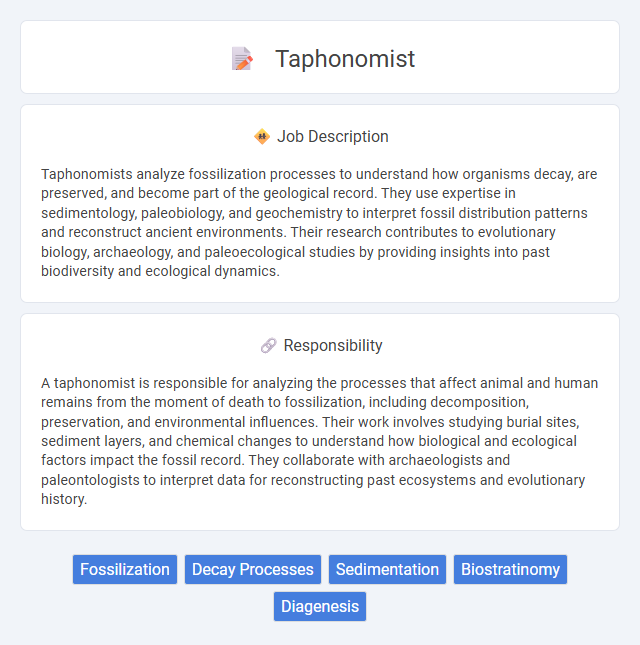
Taphonomists analyze fossilization processes to understand how organisms decay, are preserved, and become part of the geological record. They use expertise in sedimentology, paleobiology, and geochemistry to interpret fossil distribution patterns and reconstruct ancient environments. Their research contributes to evolutionary biology, archaeology, and paleoecological studies by providing insights into past biodiversity and ecological dynamics.
Individuals with strong analytical skills and a keen interest in forensic science or archaeology are likely suitable for a taphonomist role, as the job involves studying the condition and processes affecting human remains over time. Those who can handle detailed, sometimes disturbing, information about decomposition and preservation may thrive in this position. It is probable that candidates comfortable with meticulous observation and scientific methodology will find this profession fitting.
Qualification
Taphonomists require a strong background in archaeology, paleontology, or forensic science, often holding advanced degrees in these fields. Expertise in analyzing decomposition processes, fossilization, and environmental interactions is essential for interpreting site formation and preservation. Proficiency in laboratory techniques, field excavation, and data recording enhances their ability to reconstruct past biological and ecological conditions accurately.
Responsibility
A taphonomist is responsible for analyzing the processes that affect animal and human remains from the moment of death to fossilization, including decomposition, preservation, and environmental influences. Their work involves studying burial sites, sediment layers, and chemical changes to understand how biological and ecological factors impact the fossil record. They collaborate with archaeologists and paleontologists to interpret data for reconstructing past ecosystems and evolutionary history.
Benefit
The job of a taphonomist likely offers significant benefits, including opportunities to contribute to scientific understanding of fossilization and preservation processes. It probably provides access to advanced research facilities and collaboration with paleontologists, archaeologists, and geologists. This career path may also yield personal fulfillment from uncovering historical data that informs both academic knowledge and public education.
Challenge
Taphonomists likely face the challenge of accurately interpreting fossilized remains amid complex environmental and geological conditions that can obscure original biological information. The probability of encountering incomplete or fragmented specimens adds difficulty to reconstructing past ecosystems and understanding decay processes. These challenges demand a strong analytical approach combined with expertise in both biology and earth sciences to draw reliable conclusions.
Career Advancement
Taphonomists specializing in the study of fossilization processes can advance their careers by pursuing graduate degrees in paleontology, archaeology, or geology. Gaining expertise in laboratory techniques and field excavation methods enhances their qualifications for research roles or academic positions. Professional development through publications, conference presentations, and collaboration with interdisciplinary teams further supports career growth in museums, universities, and environmental consulting firms.
Key Terms
Fossilization
A taphonomist specializes in studying the processes of fossilization, analyzing how organisms decay and become preserved over time within geological contexts. They examine factors like environmental conditions, sedimentation rates, and chemical interactions that influence the transformation of biological material into fossils. Their expertise provides critical insights into paleoecology, aiding in reconstructing past ecosystems and evolutionary histories.
Decay Processes
Taphonomists specialize in studying decay processes to understand how organic materials transform after death, focusing on decomposition, fossilization, and preservation conditions. They analyze factors like microbial activity, environmental influences, and chemical reactions that affect the breakdown and mineralization of biological remains. This knowledge aids in reconstructing past ecosystems, burial environments, and the conditions that impact fossil records.
Sedimentation
Taphonomists analyze sedimentation processes to understand fossil preservation and site formation. They study how sediment deposition rates and particle composition influence the burial and fossilization of biological remains. This information helps reconstruct ancient environments and assess post-mortem changes in archaeological and paleontological contexts.
Biostratinomy
Taphonomists specializing in biostratinomy analyze the processes that affect organic remains from the time of death until burial, including decomposition, transport, and physical alterations. Their expertise is crucial in reconstructing past environments and understanding fossil preservation by examining sedimentary context, decay patterns, and biological interactions. Advanced techniques in sedimentology and geochemistry are often employed to decipher how post-mortem factors influence fossil assemblages and stratigraphic distribution.
Diagenesis
Taphonomists analyze the processes of diagenesis to understand the chemical, physical, and biological changes affecting fossil preservation in sedimentary environments. They examine how diagenetic alterations influence bone mineralogy, organic residue retention, and isotopic signatures critical for reconstructing paleoecosystems. This expertise supports accurate interpretation of fossilization patterns and aids in distinguishing between pre- and post-burial modifications.
 kuljobs.com
kuljobs.com